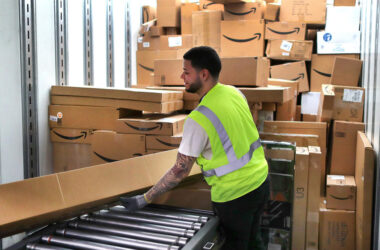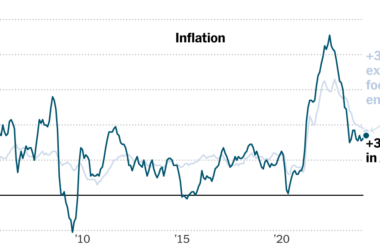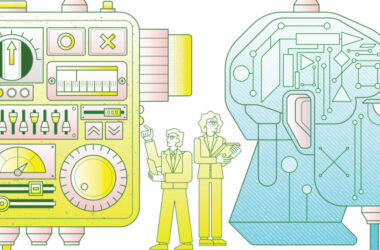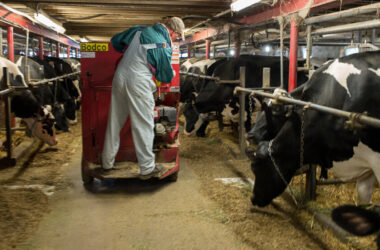The Biden administration has proposed new regulations with the aim of shifting more of the production of electric vehicle batteries and their powering materials to the United States. This is an effort to build up a strategic industry that is currently dominated by China.
The regulations are intended to limit the involvement of Chinese firms in providing materials for electric vehicles that qualify for federal tax credits. They will also discourage companies receiving federal funding to build battery factories in the United States from sourcing materials from China or Russia.
These regulations could prompt changes in automotive supply chains, which currently heavily rely on China for materials and components used in electric vehicles. Automakers are also facing significant cost pressures as they seek to adapt their factories for electric car production, and China offers some of the most advanced and lowest-priced battery technology in the world.
The Biden administration aims to use billions of dollars in new federal funding to alter this dynamic and establish a U.S. supply chain for electric vehicles.
The climate law signed by President Biden in 2022 includes up to $7,500 in tax credits for consumers purchasing electric vehicles made in the United States using predominantly domestic materials. The law also includes a general prohibition on Chinese products. lawmakers mandated that firms in China, Russia, North Korea, and Iran are prohibited from providing certain materials to cars eligible for these tax breaks.
However, the law left several questions unanswered, including the definition of a Chinese or Russian company. Administration officials indicated that these definitions encompass any entity incorporated or headquartered in China or Russia, as well as any firm in which 25 percent of the board seats or equity interest is held by Chinese or Russian governments.
Chinese companies that establish operations outside of China seemingly can benefit from the regulations as long as the Chinese government is not a significant shareholder. This provision brought relief to some automakers who feared that the Biden administration might prevent them from doing business with Chinese-owned mines or factories in the United States or other parts of the world.
Additionally, the law requires battery makers entering contracts or licensing agreements with Chinese firms to ensure that they retain certain rights over their projects. This provision is intended to ensure that a Chinese firm does not effectively control such a project.
Some conservative lawmakers had questioned Ford Motor’s plans to license technology from the Chinese battery giant, known as CATL, for a plant in Marshall, Mich., arguing that such a partnership should not be eligible for federal tax credits.
Some Republican lawmakers indicated on Friday that the guidance from the Treasury Department did not go far enough to reduce the country’s reliance on China.
“At a time when China is using massive subsidies to undercut U.S. manufacturers and throttle the global market for battery components, Treasury’s naïve new regulations would open the floodgates for American tax dollars to flow to Chinese companies complicit in trade violations and forced labor abuses,” said Representative Mike Gallagher of Wisconsin, chairman of the House Select Committee on the Chinese Communist Party.
The regulations will take effect for battery components in 2024, and in 2025 for critical minerals such as lithium, cobalt, and nickel. They could be adjusted based on industry feedback.
The regulations could have a significant impact on the U.S. electric vehicle market, which is growing rapidly. Battery-powered vehicles accounted for about 8 percent of new car sales in the third quarter. Car and battery manufacturers stated on Friday that they were still evaluating the regulations, and it will take time to determine how many models would qualify for tax credits.
Tesla stated on Friday that the two least expensive versions of its Model 3 sedan would only qualify for half of the $7,500 credit beginning in January. The Model Y sport utility vehicle might also not qualify for the full credit after Dec. 31, Tesla said. Both the Model Y and Model 3 are the top two electric vehicles by sales in the United States. Tesla purchases some batteries from CATL.
John Bozzella, the CEO of Alliance for Automotive Innovation, wrote in a blog post on Friday that the regulations struck “a pragmatic balance,” including by exempting trace materials. He mentioned that if the administration had banned all minor Chinese parts from the supply chain, no car models might have qualified for tax credits next year.
Many cars have already been disqualified from purchase credits by other regulations, such as a requirement that vehicles be assembled in North America. Currently, only about 20 vehicles qualify for the program out of more than 100 electric vehicles sold in the United States.
The regulations also raised new concerns about whether stricter supply chain requirements could continue to drive more consumers to lease, rather than purchase, vehicles.
The prohibition on sourcing from China applies only to vehicles that are sold and not to those that are leased. Consumers can receive tax credits for electric vehicles they lease from auto dealers, leading to a surge in E.V. leasing.
Jack Fitzgerald, chairman of Fitzgerald Auto Malls, which operates dealerships in Florida, Maryland, and Pennsylvania, indicated that he had observed an increase in customers leasing electric vehicles. However, he mentioned that concerns about electric vehicle range and the availability of chargers, rather than price, were holding back electric vehicle sales.
“That’s the principal thing,” Mr. Fitzgerald said.
Auto industry lobbyists have cautioned that extremely stringent regulations could stifle electric vehicle sales and have urged the administration to negotiate more trade deals to secure supplies of scarce battery minerals. However, Paul Jacobson, the CFO of General Motors, stated that the company had structured its electric vehicle operations to be successful regardless of the federal regulations.
“We’re not anchoring the business on saying this has to happen” in regards to regulations, Mr. Jacobson told reporters on Thursday. He added that if regulations change, “it’s not a backbreaking thing for us.”
While the regulations may pose challenges for automakers, they are likely to benefit companies planning to supply batteries from factories in the United States.
“It’s actually good news for us,” said Siyu Huang, CEO of Factorial, a Massachusetts company that is developing next-generation electric vehicle batteries with support from Mercedes-Benz, Hyundai, and Stellantis, the owner of Dodge, Jeep, and Ram.
Obtaining substantial amounts of lithium, an essential battery ingredient, could be challenging because most of the metal is processed in China, according to Ms. Huang. However, the regulations will encourage investment in U.S.-based refineries. “It’s definitely going to be another incentive to build more domestic supply,” Ms. Huang said.
John DeMaio, CEO of Graphex Technologies, which is constructing a factory in Michigan to process graphite for batteries, mentioned that the regulations might temporarily slow electric vehicle sales by making it harder to qualify for the tax credit. However, he added that in the long run, they will encourage investment in domestic suppliers.
“It might be a hiccup,” he said, “but in general, it provides certainty and clarity to get people off the fence.”
Wally Adeyemo, the deputy secretary of the Treasury Department, stated in a briefing with reporters that the regulations would help advance the administration’s goals of developing an American clean energy supply chain and reducing emissions in the transportation sector.
“These changes take time, but companies are making the investments and Americans are buying these cars,” he said.
Over the past year, companies have invested $213 billion in the manufacturing and deployment of clean energy, clean vehicles, building electrification, and carbon management technology in the United States, according to tracking by the Rhodium Group and the Center for Energy and Environmental Policy Research at the Massachusetts Institute of Technology. This marks a 37 percent increase from a year earlier.
.
However, the global electric vehicle industry remains heavily centered in China, which is the world’s largest producer and exporter of electric vehicles. China produces about two-thirds of the world’s battery cells and refines most of the minerals crucial for powering electric vehicles.
The regulations also prohibit automakers from sourcing nickel used in their batteries from Russia, which is one of the world’s largest nickel producers.
One of the challenges for automakers will be developing systems to track all the components of their battery through a long, and often opaque, supply chain.
Vehicles that are reported incorrectly will be subtracted from an automaker’s eligibility for tax credits, Treasury said, and automakers that commit fraud or intentionally disregard the rules could be declared ineligible for the credit in the future.








